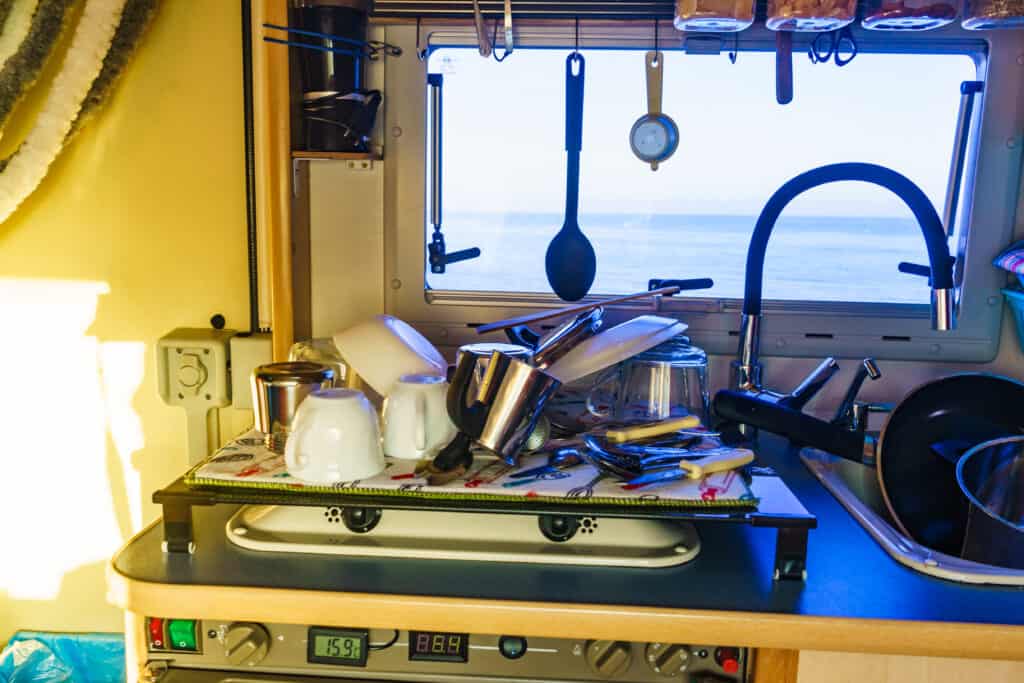
Your musty RV smells might not be pretty. But don’t get too bummed out over that yet. First, think about your incredible machine! This vehicle allows you to travel while sleeping, eating, and generally cohabitating as though you were at home.
You could spend hours traversing roads and taking in the sights. Well, that is, until you breathe in and really smell your RV.
At first, you ignored it. You grabbed some air freshening spray and blasted the rooms. That worked for a little while.
The smell continued to grow, though, and now it’s the point where you can’t ignore it. Air fresheners don’t work anymore, nor does keeping the windows down.
Ten Ways to Get Rid of Musty RV Smells
These 10 solutions are all homemade, so chances are you might already have everything you need in your RV already. How handy is that?
10. Use Baking Soda for the Fridge
Your refrigerator is perfect for keeping your drinks cold and your food fresh. Its diminutive size makes cleaning its insides a hassle, though.
You know you can’t keep putting off cleaning the fridge forever. Even after you gut it, it still gives off a slightly odorous smell, one that’s a combination of all the foods you’ve stashed in there.
In short, it stinks.
To do something about it, all you need is baking soda. Grab a bowl and pour in some water. A couple of tablespoons will do. Then, add your baking soda, at least half a cup. With a wooden spoon or similar utensil, stir the mixture together.
It should harden up somewhat into a paste. Use said paste to give your refrigerator the deep scrubbing it so desperately needs.
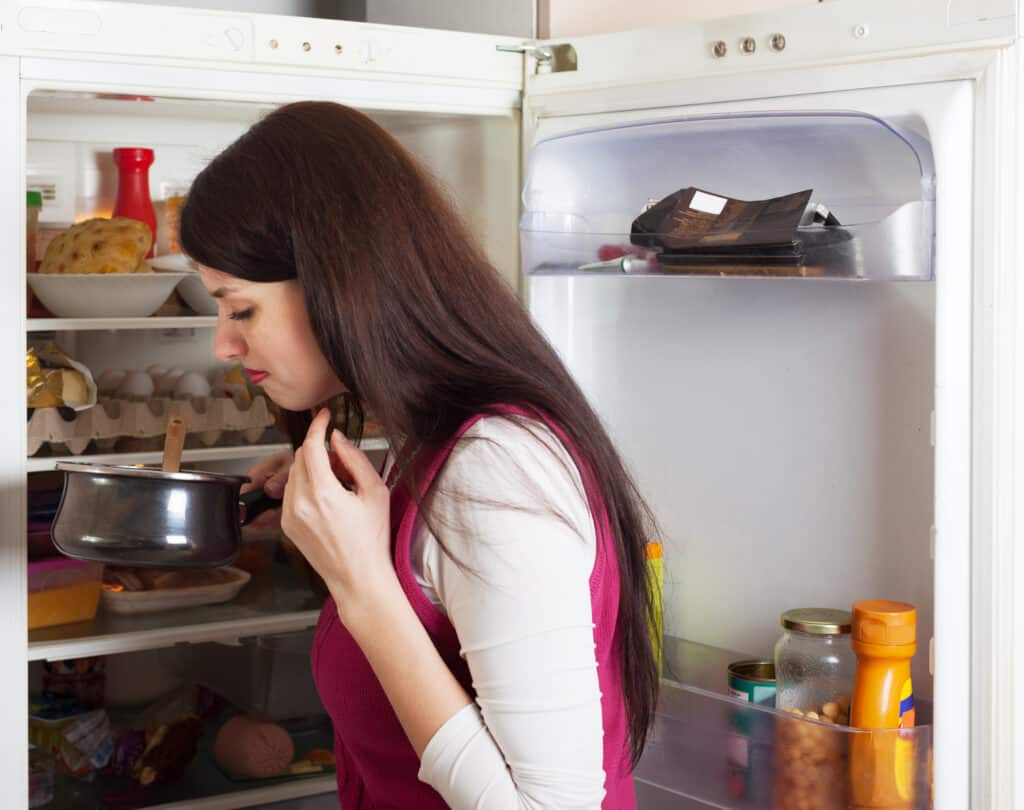
9. Air Out Smells as You Make Them
An RV, even the biggest one, is still a tightly enclosed space. Air doesn’t have as far to travel as it would in say, a home or even a small apartment. That means that it doesn’t take nearly as much for a smell to build up and become trapped within the motorhome walls.
This isn’t your fault at all; it’s just the nature of an RV. That said, you can combat this odor buildup.
If you know you’re going to be doing some scent-heavy cooking or other work in the RV, open the windows and vents throughout the vehicle. Don’t skip one, as you want air to be able to travel freely.
You don’t have to be driving when you do this, although that does help the odors disperse and leave the vehicle more easily.
Once you’re done with the cooking/etc., close the windows and vents again. If there’s any leftover smells, these should be much fainter than they would had the vehicle been closed up the whole time.
8. Keep out Dust and Exhaust Via the Windows and Vents
It’s especially important you remember to close all your windows and vents when you’re done airing out the vehicle.
Why?
As you drive, your RV releases exhaust. This is a combination of water, nitrogen, carbon dioxide, and carbon monoxide, aka stuff you don’t want to breathe in.
Since your RV is considerably larger than the average car or truck, it gives off more exhaust than said average car or truck.
That increases the likelihood of the exhaust smell making its way in your vehicle. Not only is this unpleasant to breathe in, but it can be dangerous for your health (and the health of your passengers).
There’s more than exhaust to worry about, but dust as well. If you or a passenger has allergies, exposure to dust can trigger them. That would make any road trip a bad time.
When you plan to drive, check your windows and vents before you hit the road. Make sure these are all closed.
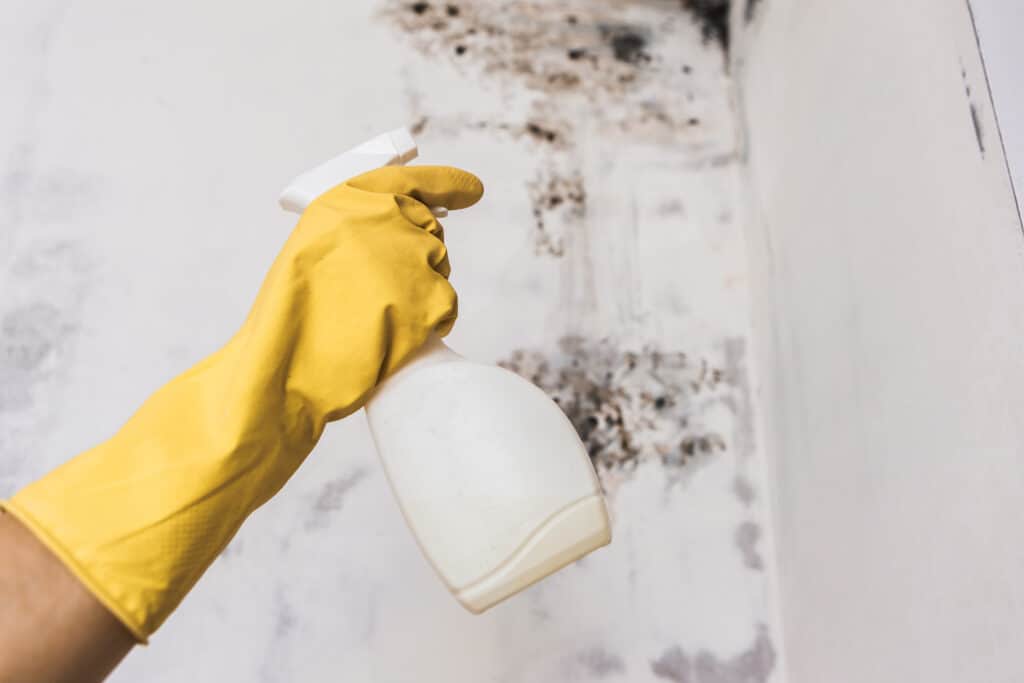
7. Avoid Carpets
Carpets may seem like a tempting addition to your RV because they’re plush and comfortable. They also create a relaxing ambiance compared to hardwood or laminated floors.
As it turns out, carpets can also be a hotbed for stinky, hard-to-remove musky smells.
Think about it: every time you or a passenger walks through the RV with shoes on, you’re grinding dirt, debris, and more into the carpet. If you have a pet on board, their hair will get in the carpet fibers, too.
You can always clean your carpet when it begins to get stinky, but this can be time-consuming. Plus, unless you’re willing to get on your hands and knees and shampoo the carpet, you’re not truly getting the odors out.
That’s why it’s recommended by many RV owners to forego carpeting altogether. You’re saving yourself time that you’d otherwise have to spend scrubbing the carpet. You can also get away with not having a vacuum (or at least having only a handheld vacuum, which takes up far less space).
If you’re not a huge fan of hardwood flooring, you can always buy a few rugs. When these get dirty, you can take them outside and shake them out. You can also run them through the washing machine to get out odors.
6. Regularly Clean the Water System
The water system in your RV is not impervious to getting dirty. If you don’t clean it at least semi-regularly, you may have the misfortune of sitting down to a cup of coffee or a cold glass of water one day and tasting nothing but sulfur.
This water is disgusting and definitely not potable.
What should you do? Is it time to throw out your water system? After all, it was working just fine a few days ago. Now what’s up with it?
The taste of your water has a lot to do with the quality of the water in the areas you’re traveling. It could be that the water is more sulfuric in the place you’re now temporarily calling home.
That doesn’t mean you have to drink and bathe with bottled water.
Instead it’s time to give your water system the sanitizing it deserves.
To do so, you need water and bleach. Combine equal parts of both liquids. Then add that combination to a container that’s at least one gallon.
Refill your water tank with fresh water. Run your pump at full blast. The bleach scent should fill up the room. This is normal though! At that point, turn the faucets off.
Your water system should be clean and you shouldn’t have an issue with sulfur again. Remember to make this a regular part of your RV cleaning routine!
5. Clear Out Uneaten Food as Often as You Can
This tip is dually beneficial.
First off, there are so many small spaces in your RV that if food isn’t in plain sight, you can stash it away somewhere and never find it again. Some foods have a shelf life of a few months, especially if they’re processed. Snacks like cereal, pretzels, chips, popcorn, and the like should be fine for a while, as long as the bags are sealed or clipped up when opened.
It’s foods like bread, produce, and meats you have to be careful about. These have a much shorter shelf life, often just a few days to a week. If these foods aren’t refrigerated (with the exception of bread), they can go sour even faster.
Depending on if you run the air conditioning or heat in your RV, the temperature differences as you travel can sometimes be enough to speed along the rotting process.
You do not want to scour your whole RV only to find moldy, rotten food the source of your stinky vehicle. Make it a point to use food as soon as you buy it and stash it properly. Some foods are meant to be refrigerated, for instance, while others don’t have to be.
So what about the second reason you need to be diligent about not keeping food in the RV long-term?
Rats, mice, and other critters.
Although you may like to think your RV is rodent-proof, you’d be surprised. If someone leaves a window or a door open for too long, these persistent creatures will find their way in and start feasting on your food.
Rodents leave droppings, and these will stink up your motorhome in a hurry. Also, you’ll have to catch (and possibly kill) the rodent, which is time-consuming and—let’s be honest—pretty gruesome.
4. Drain Your Bathroom’s Holding Tanks
The bathroom can get filthy in your own home. In an RV? Where everything runs on a system of pipes and tanks?
That’s a whole ‘nother story.
Still, as an RV owner, this is a dirty job you have to commit to on occasion. Here’s what you’ll need:
- A 30-foot sewer extension hose
- A sewer adapter
- Bleach wipes
- A black water flushing rinse hose
- Disposable gloves
Check on your holding tank. How full is it? It should be almost to the top, but not so full that it’s about to overflow.
Once you have your gloves on, connect your sewer hose to your adapter. Then, connect the holding tank drain outlet to the adapter as well.
Going very slowly (you don’t want to rush in case any waste spills out), release the black water tank valve. Let the waste pour out, and again, take your time.
Clean the holding tank (preferably with a permanent-mount black tank rinse system if you have one) and repeat each time the tank gets close to full. Here, you can read an article I wrote that teachers, in detail, how to clean your RV black water tank. It even gives suggestions for tools to use to get the job done.
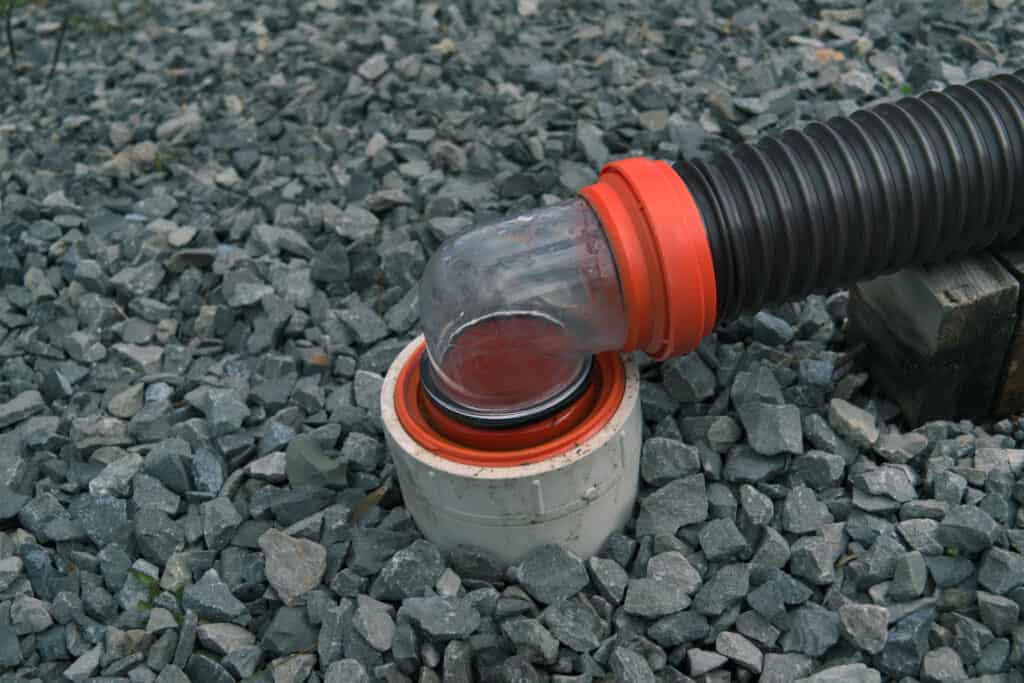
3. Keep Your Kitchen Drains Clean
Just when you thought you were done with the dirty work, you’re not. Sorry.
I talked before about how the refrigerator can be a hotbed for stinky odors. What if you clean the fridge and your kitchen still smells musty?
Your kitchen sink drain may be the culprit.
You know the drill: food particles and other food waste slowly accumulate in the sink, backing it up with gunk. Now, each time you wash your hands or do the dishes, the sink is very slow to drain.
Luckily, this is an easy and short fix that’s not nearly as unpalatable as draining the bathroom’s holding tanks.
Fill up four cups of boiling water, a cup of vinegar, and two tablespoons of baking soda. Pour through the drains one substance at a time, adding the water last.
The clogging should be solved, and your mystery kitchen smells should disappear.
2. Know How Mildew Grows to Prevent It
Mildew is not only smelly, but it’s horrible for your health. This fungus typically grows in hot, wet spaces, which makes your bathroom and kitchen likely targets.
Luckily, by being diligent, you can keep mildew away.
Here are four ways:
- Look for and plug up leaks in and around the toilet, indoor and outdoor hook-ups, sinks, and showers.
- Clean your sinks and showers often, preferably with water and bleach.
- When using the bathroom shower or kitchen, keep the vents (and possibly windows) open. This keeps all that stale, humid air from staying in one place and encouraging mold growth.
- Look at your seals and gaskets. Are these leaking anywhere? Again, this could lead to mold, so patch these up.
If you do have mold, you’ll either have to buy a mold remover or call a professional. Wondering if your travel trailer insurance covers water damage? In this article, we answer that commonly asked questions, as well as talk about how to check for water damage.
1. Air out that Storage Odor
Chances are, you don’t drive your RV throughout the whole year. You likely give it a breather in at least the wintertime. When you’re not driving your vehicle, it’s waiting in storage.
The longer it waits, the more unpleasant scents will accumulate. By the time you open your RV doors for the first time after a break, you’ll run down the block pinching your nose.
It doesn’t have to be this way, though. Take the following precautions to keep your motorhome road-ready anytime:
- Spray your vehicle down with a deodorizer the moment you open the doors. This should clear most of the bad smells and even mildew!
- Get vent covers. These fit so your vents can stay open. That means your RV isn’t sitting for months collecting smelly air.
- Don’t leave your RV for longer than you have to. Even if you don’t plan on driving it for a few more weeks, airing it out every month or so will prevent any stinky surprises.
Conclusion on Musty RV Smells
Your RV is your pride and joy. But you have to admit, musty RV smells happen. Luckily, with these handy, homemade tips, you can tackle any kind of odors that sprout from your RV, be those from the kitchen, bathroom, or any other space.

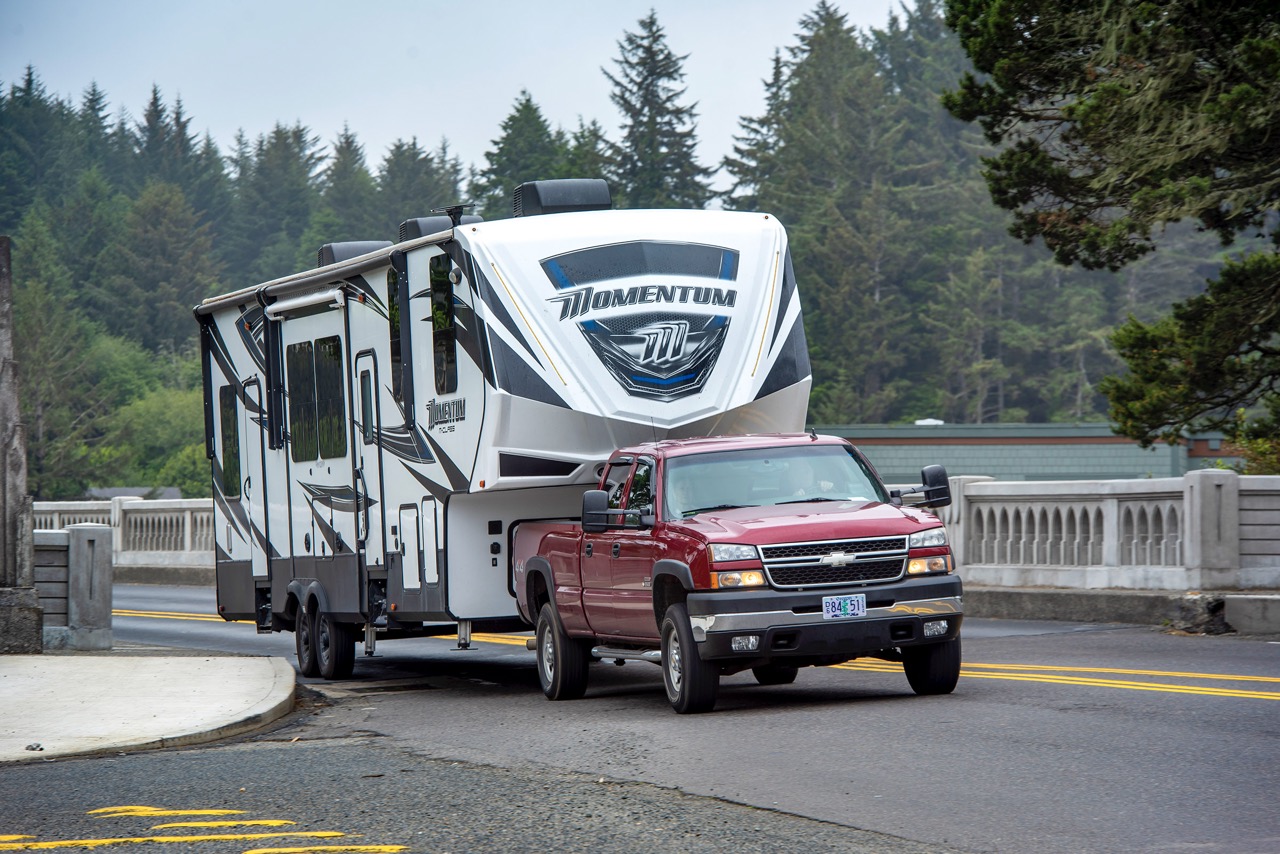
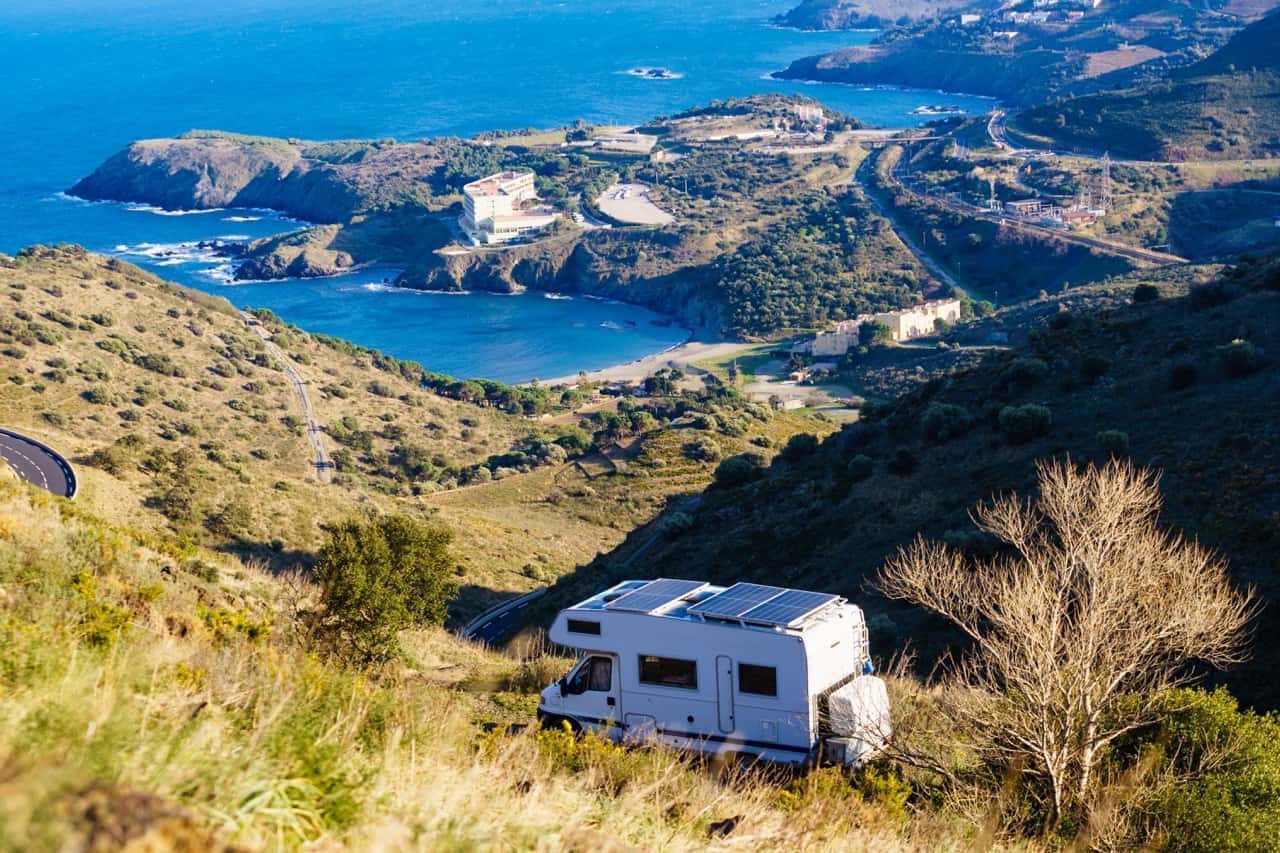

I suggest using a white vinegar rinse when flushing out the water system, especially if doing so to treat a sulfur smell. While bleach can sanitize, it will also oxidize the water. With heavy mineral deposits in your system, oxygen from the bleach will turn everything it touches orange. Rinse well with white vinegar after using bleach to prevent this staining.
We have Heartland RV bought brand nee 2012 and it was perfect and still looks new but last year we discovered mold around the inside of our door, right in the corner where it opens. Took it to travel land. They had it for months. When we finally got it back the door had dents around rge edges and the mettle trim around the door was bent and dented, but the mold smell was gone and it appeared to be fixed. We took it back and asked that they fix the door and they did. They told us that heartland did not put a water barrier around the door and we bieved traveland found the problem and fixed it. So spring comes and we open the trailer only to smell the mold again. And the door doesn’t close as easily as it use to. Feeling disolutioned because we baby this trailer and try to keep it looking as new as the day we bought it. Not wanting to take it back to travel land, does any one have suggestions on where or who to see to solve our problem? It’s in our door. There must be a leak. But we are inept on how to fix it. ?
Have new RV and if we leave clothes in closet they STINK. What can I do
My coach is a 1976 Tioga 2. My insulation is gone how can I put the insulation in my motorhome by myself with less cost cuz I live in it and I want to go back to Alaska which won’t be until down the road. Also I need to know a free floor plan where I can completely redo it inside. Does anyone have that I live alone with my two chihuahuas. I’m homeless well I’m not homeless I have a roof over my head. I appreciate any type of help Merry Merry Christmas
All the wood cabinets and drawers have a funky smell. Now our clothes smell the same it’s a 37 foot doubletree so lots of cabinets. Help !!!!
Have you find a solution..I got the same problem
I always put Downey fabric sheets in with our clothes, depending how big the closet is use several sheets and they smell so good.
Me too. Did you find a answer?
In our case the solution was to find the leak that is creating saturated sound absorbing underlayment under the passenger side footwell. Remove and replace carpet and underlayment.
All of the above has been done but, nothing worked. When we take out the clothes, towels and…. after a trip, I have to wash them
twice to get the smell out!!
What is the smell like? If it’s a strong musty smell you may have an unseen mold problem.
Same thing here but today we found water damage that came in under the slide outs. What a mess..Had to take up the flooring and put in all new. Now it is great..It was all rotten in the back of the trailer..
We bought a 2013, 25-foot travel trailer in excellent condition. We have never owned one before. To our dismay, we noticed a musty smell and I can’t stand it. We looked everywhere for a leak and I know they stored it in a pole barn which can hold moisture. We have sanitized the holding tanks, checked for leaks, and found none. I appreciate you sharing about the slideout. There is carpet in the slideout area, but nowhere else. We will have to check under the slideout as you did.
And ?